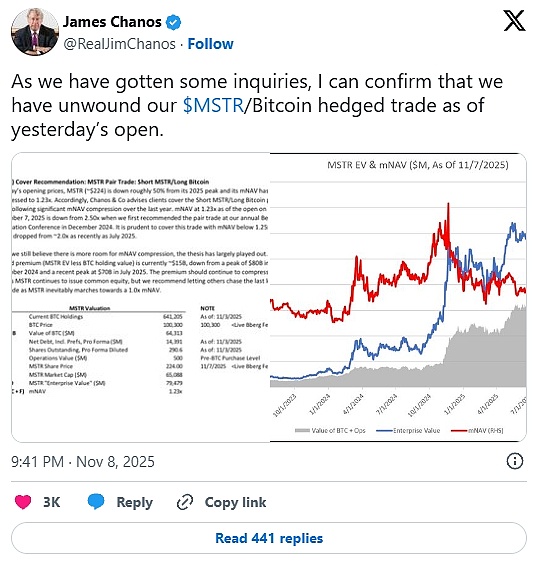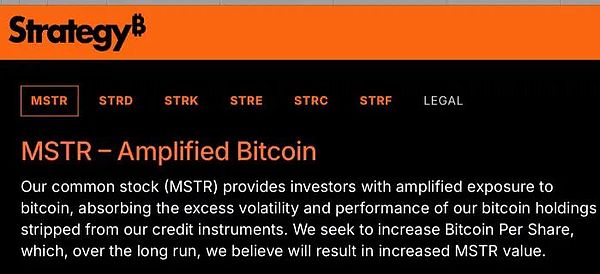
Author:Craig Coben

Over the weekend, short seller Jim Chanos announced that he had closed out his long Bitcoin and short pair trade position in the common stock of Strategy (formerly MicroStrategy), the original and largest Bitcoin reserve.Chanos didn’t disclose the size of his position or how much he profited, but it’s reasonable to assume he walked away with a sizable gain.

Pairs trading involves going long one security while shorting another highly correlated security, allowing you to remain roughly market neutral.Chanos is therefore not betting on Bitcoin falling, but rather that the premium embedded in Strategy’s share price relative to the value of its Bitcoin holdings remains unsustainably high.
This judgment has been proven correct.Strategy’s share price premium has slipped from nearly 3 times net asset value last November (when FTAV first discussed its capital raising plans) to about 1.2 times today.Bitcoin is up about a third over the past 12 months, while Strategy shares are down more than a quarter.Strategy’s grand claim to offer an “amplified version of Bitcoin” was shattered.

In hindsight, Chanos’s pairing seems obvious, but it was by no means a sure thing at the time.Shorting anything comes with its own set of risks and costs.Shorting a stock with a loyal retail following and a leader as charismatic and preachy as Michael Thaler adds a new layer of risk.
Financing costs for stock borrowing are one thing, of course, but the truly scary scenario is a short squeeze.If a flurry of Thaler-induced retail enthusiasm pushes the stock higher, Chanos could be forced to throw in the towel with a painful loss, much like Melvin Capital was crushed by traders organized by Reddit in the GameStop saga.Given Seiler’s relentless online presence and his eerie ability to evoke and inspire his digital fan base, the stakes of this fandom are very real.
Chanos must have felt more confident that investors would conclude that Strategy’s ornate structure provided an overly complex and overpriced way to gain exposure to Bitcoin.In his view, the high NAV premium will only fall.The enlarged Bitcoin is more like the zero version of Bitcoin.
In a way, Chanos simply mirrors what Strategy and its senior management have been doing.Companies have been aggressively selling their own stock to buy more Bitcoin.Management, meanwhile, has also been an enthusiastic seller of Strategy stock, timing most of their sales perfectly last year when it was near all-time highs.
Chanos’ successful deal highlights core structural flaws in Strategy’s business model.Despite the company’s fanfare and showmanship, it remains a high-priced and high-risk investment vehicle in Bitcoin.Its traditional software business has almost no cash flow, leaving the company dependent on capital markets to fund its frenzied buying of Bitcoin.
Typically, this means issuing common stock.But Thaler also issued more than $8 billion in additional convertible debt.There is a limitation with convertible bonds: If the stock price rises not enough for investors to convert, the bond needs to be repaid at maturity or when the investor exercises their right to redeem.Thaler quietly stopped issuing new convertible debt late last year due to a slew of bond maturities and redemptions in 2028.But constant issuance of common stock has its drawbacks: Existing shareholders can be diluted and share prices can fall due to excess supply.
Fully aware of this, Thaler turned to a new strategy this year: preferred stocks.The company has just announced its fifth perpetual preference share offering, this time denominated in euros, in an effort to globalize its financing base.But perpetual preferred shares from a junk-rated issuer like Strategy are not easy to sell, so the coupons have to be very attractive.The euro preferred shares must be issued at a price of 80% of face value, giving investors a 12.5% yield after deducting the issuance discount.
And those coupon payments, plus interest on the convertible bonds, now exceed $700 million annually.Because Strategy itself doesn’t generate operating cash flow, it ends up having to issue more common stock or preferred stock to pay dividends, further exacerbating the pressure on common stock at the bottom of the capital structure.
Whenever someone brings up the issue of Strategy’s lack of cash flow, the most immediate retort is that the company holds about $70 billion worth of Bitcoin.On paper, this over-collateralization may seem reassuring – but if Bitcoin were used to pay dividends or repay maturing debt, it would seriously undermine the hold-for-the-long-term (HODL) philosophy that Thaler has long advocated and could cause the market to sell off before him.Strategy’s Bitcoin reserves are not ordinary collateral and cannot be liquidated at will without any consequences.
All in all, Chanos spotted a basic arbitrage opportunity and executed it calmly.He has closed his position now, which means that easy profit is a foregone conclusion.But the question remains: Is Strategy’s common stock a “bigger version of Bitcoin” or something less alluring?






